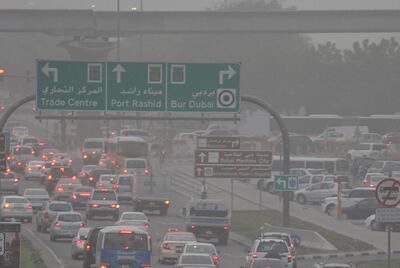An early weather warning system for people with conditions such as asthma is one of several measures being considered by the UAE in response to climate change.
Extreme temperatures or dust storms can exacerbate these conditions and flood hospitals with sufferers. So an early warning system that helps people prepare could help alleviate pressure on health facilities.
Smartphone apps such as the Abu Dhabi-backed "Plume Air Report" help residents monitor the country's air quality but this is the first time patients would be targeted.
On Wednesday, Fahed Al Hammadi of the UAE’s Ministry for Climate Change and Environment, said the battle was not just about big events but other contributions such as this system.
“We are working with the Ministry of Health,” he said. “Can we develop an alerting system in the event of a heatwave that alerts people who are sufferers?”
A US study published in April found that the UAE has the second highest rate - after Kuwait - of childhood asthma linked to traffic pollution in the Middle East with 460 cases per year per 100,000 children.
It comes as the UAE will present a report on how the country is tackling climate change at next month’s UN conference on the issue in Spain.
The key meeting, known as Cop 25 (the 25 edition of the conference of parties), runs for two weeks from December 3 and is a chance for global leaders to assess where the world stands on climate change.
The UAE is sending a delegation of more than 80 people, headed by Minister for Climate Change and Environment, Dr Thani Al Zeyoudi. “What makes this special is that many decision-makers and activists from all around world realise this is the last step,” said Mr Al Hammadi. “It is really, very important.”
Reflecting on the UAE study, he said other countries can learn from how the Emirates deals with climate change, such as in the materials used in roads and buildings.
“We reached almost 52°C here this summer,” said Mr Al Hammadi.

“Others might reach this in 20 to 30 years. We are the future the world expects so our experience here is quite important.”
Atmospheric CO2 is one of the greenhouse gas emissions and is mainly created by fossil fuels. According to the Environment Agency Abu Dhabi, the emirate’s CO2 emissions per capita are equivalent to 37.4 metric tonnes, one of the world’s highest rates.
Mr Al Hammadi said cooling and desalination are responsible for a significant part of emissions but each country’s challenge was unique. “Give me a nice climate and we get rid of all the cooling. We can’t live without cooling here. But all entities are trying. Walk around Abu Dhabi today and you can see cycling paths and more public buses.
“If climate change affects Chile, it will affect UAE as we import 80 per cent of food. That’s why we are investing in agriculture such as vertical farming. It is going to be embedded everywhere.”
The Madrid summit, meanwhile, has taken on a new urgency. Protests across the world - in part led by young activists such as Sweden’s Greta Thunberg – have forced leaders to ramp up efforts to implement the Paris agreement.
Signed by most of the world’s countries in 2015, the deal seeks to keep increases in global temperatures to below 2°C above pre-industrial levels and to limit the increase to 1.5°C. By December 2020, signatories to Paris must commit to their enhanced pledges to reduce greenhouse gas emissions by 45 per cent by 2030 and carbon neutrality by 2050.
“This conference is the launchpad to the implementation of the Paris deal,” said Mr Al Hammadi.
It is taking place against the backdrop of an increasingly grave global situation. The UN has warned that the world faces increases of more than 1.5°C above pre-industrial levels in a decade if there is no change to how we live.
Coral reefs are dying, droughts are commonplace and extreme weather increasing.
Just a few days ago, the UN warned emissions are still rising even as the situation becomes more fraught. Its annual report warned countries must increase carbon-cutting ambitions by five times if the world is to prevent warming by more than 1.5°C.
But Mr Al Hammadi said countries were aware of the gravity of the situation. “Some are reluctant but there is a reason whether financial or technology. But there is good progress,” he said.
Meanwhile, the UAE’s federal law on climate change is expected to come into force early next year.
First announced in September, it is envisaged the law will require Government bodies to assess the risks from climate change prior to starting major projects across infrastructure and health.


